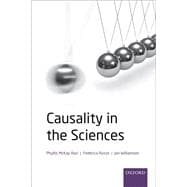
Note: Supplemental materials are not guaranteed with Rental or Used book purchases.
Purchase Benefits
What is included with this book?
| List of Contributors | p. ix |
| Introduction | p. 1 |
| Why look at causality in the sciences? A manifesto | p. 3 |
| Health sciences | p. 23 |
| Causality, theories and medicine | p. 25 |
| Inferring causation in epidemiology: Mechanisms, black boxes, and contrasts | p. 45 |
| Causal modelling, mechanism, and probability in epidemiology | p. 70 |
| The IARC and mechanistic evidence | p. 91 |
| The Russo-Williamson thesis and the question of whether smoking causes heart disease | p. 110 |
| Psychology | p. 127 |
| Causal thinking | p. 129 |
| When and how do people reason about unobserved causes? | p. 150 |
| Counterfactual and generative accounts of causal attribution | p. 184 |
| The autonomy of psychology in the age of neuroscience | p. 202 |
| Turing machines and causal mechanisms in cognitive science | p. 224 |
| Real causes and ideal manipulations: Pearl's theory of causal inference from the point of view of psychological research methods | p. 240 |
| Social sciences | p. 271 |
| Causal mechanisms in the social realm | p. 273 |
| Getting past Hume in the philosophy of social science | p. 296 |
| Causal explanation: Recursive decompositions and mechanisms | p. 317 |
| Counterfactuals and causal structure | p. 338 |
| The error term and its interpretation in structural models in econometrics | p. 361 |
| A comprehensive causality test based on the singular spectrum analysis | p. 379 |
| Natural sciences | p. 405 |
| Mechanism schemas and the relationship between biological theories | p. 407 |
| Chances and causes in evolutionary biology: How many chances become one chance | p. 425 |
| Drift and the causes of evolution | p. 445 |
| In defense of a causal requirement on explanation | p. 470 |
| Epistemological issues raised by research on climate change | p. 493 |
| Explicating the notion of 'causation': The role of extensive quantities | p. 502 |
| Causal completeness of probability theories - Results and open problems | p. 526 |
| Computer science, probability, and statistics | p. 541 |
| Causality Workbench | p. 543 |
| When are graphical causal models not good models? | p. 562 |
| Why making Bayesian networks objectively Bayesian makes sense | p. 583 |
| Probabilistic measures of causal strength | p. 600 |
| A new causal power theory | p. 628 |
| Multiple testing of causal hypotheses | p. 653 |
| Measuring latent causal structure | p. 673 |
| The structural theory of causation | p. 697 |
| Defining and identifying the effect of treatment on the treated | p. 728 |
| Predicting'It will work for us': (Way) beyond statistics | p. 750 |
| Causality and mechanisms | p. 769 |
| The idea of mechanism | p. 771 |
| Singular and general causal relations: A mechanist perspective | p. 789 |
| Mechanisms are real and local | p. 818 |
| Mechanistic information and causal continuity | p. 845 |
| The causal-process-model theory of mechanisms | p. 865 |
| Mechanisms in dynamically complex systems | p. 880 |
| Third time's a charm: Causation, science and Wittgensteinian pluralism | p. 907 |
| Index | p. 929 |
| Table of Contents provided by Ingram. All Rights Reserved. |
The New copy of this book will include any supplemental materials advertised. Please check the title of the book to determine if it should include any access cards, study guides, lab manuals, CDs, etc.
The Used, Rental and eBook copies of this book are not guaranteed to include any supplemental materials. Typically, only the book itself is included. This is true even if the title states it includes any access cards, study guides, lab manuals, CDs, etc.